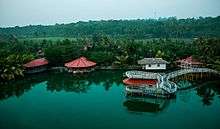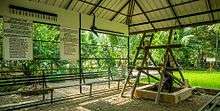Agricultural theme park

An Agricultural Theme Park, the brainchild of James Kurian,[1][2] is a park with agricultural themes. Kurian developed the concept.[3] It took more than 11 years of effort to make the project as it is now.[4]
Precipitating Conditions for Creation of Agricultural Theme Park

India has millions of subsistence farmers. In almost all cases, traders and intermediaries take all of the profit, leaving farmers with little compensation. Farmers suffered losses, driving some to suicide as the farmer suicide rate rose in the 1990s and 2000s.[5] Erratic weather led to massive crop loss and compounded economic distress. Traders were largely unhurt because they could still engage in arbitrage.
Kurian was originally a farmer and was familiar with the plight of Indian farmers. He began searching for a way improve their lot. He concluded that farmers should sell their goods directly to consumers, cutting out intermediaries. Kurian also felt that farmers could increase their income by moving beyond produce.
Description
Agricultural theme parks are made within an agricultural area or adjacent to an agricultural area to give supplementary income and to add value to farm products. The main idea is to bring the buyer directly to the farm and to sell farm products directly to the buyer without intermediaries.
Agricultural theme parks are appearing in places such as in Maine,[6] Michigan[6] and the Philippines.[7]
Benefits
Agricultural theme parks help farmers earn supplementary income from agricultural farms, help farmers sell farm products in a value added way, incentivize farmers to turn away from harmful insecticides and pesticides and towards organic farming and preserve biodiversity. Organic products fetch higher prices in many places.
Agricultural theme parks offer facilities for entertainment, pleasure, health care, education, lodging and research. The park encourages visitors to participate in farming and farm-related activities, giving them the opportunity to experience traditional farm culture. These activities and facilities support the farmers and also promote sales of agricultural products. The value-added farm products are sold through organic vegetable & fruit stores and are served to visitors as prepared food through on-site restaurants. The park provides facilities for visitors to pick and cook their own food.
References
- ↑ Superbrain.jr (2012-08-17), English: The News paper cut out of the article that was reported on Malayala Manorama Newspapers's Kottayam Edition on 17th August 2012, retrieved 2016-01-29
- ↑ Superbrain.jr (2012-08-17), English: N.K Kurian, the winner of "the best agriculturist award" of Athma from Kaduthuruthy block., retrieved 2016-01-29
- ↑ "Mango Meadows Agricultural Theme Park". World's first agricultural theme park.
- ↑ "Agricultural theme park turns spotlight on Ayamkudi". ManoramaOnline. Retrieved 2016-02-09.
- ↑ "NDA, UPA failed to curb farmer suicides - Times of India". The Times of India. Retrieved 2016-02-03.
- 1 2 "Bangor Daily News - Google News Archive Search". Retrieved 24 February 2016.
- ↑ "Philippine Daily Inquirer - Google News Archive Search". Retrieved 24 February 2016.